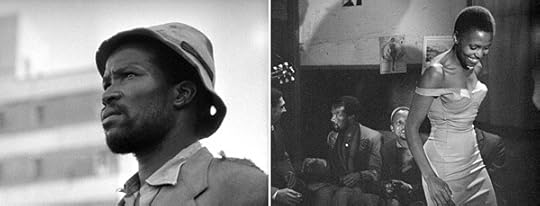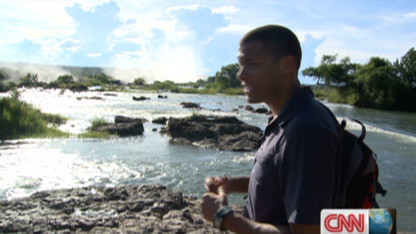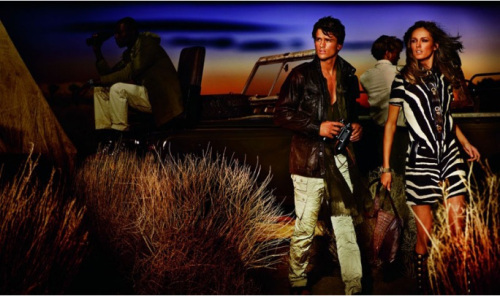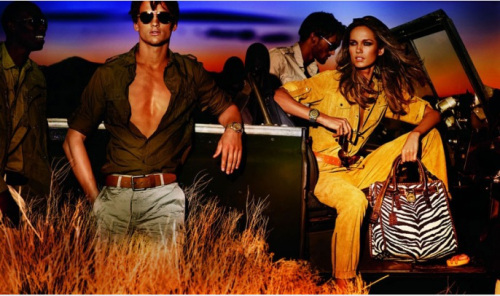Sean Jacobs's Blog, page 569
January 31, 2012
Music Break. Corneille and La Fouine
Crooner Corneille (born in Germany, raised in Rwanda and now a Canadian citizen) performs two of his songs with the help of rapper La Fouine (French of Moroccan descent)–we've featured them here before separately–live on French radio show, Planete Rap Skyrock.








Kinyarwanda goes online
In January 2011 director Alrick Brown's feature "Kinyarwanda"–a film about "6 people struggling through the Rwandan genocide"–won Sundance's award for "World Drama" (that's a big category, but we'll move on). In December last year it had a limited release, including here in New York City. I missed the screenings. In most cases films like "Kinyarwanda" would vanish and months later pop up on Netflix with little marketing where, unless someone in the know tells you, you'll know never see it. Or the filmmakers will do their own guerrilla marketing. But that won't be needed now as digital rights to "Kinyarwanda" have been snapped up by Snagfilms, which has an online library of more than 3000 films. That means you can order it or see it via Snagfilms' partners "… Comcast Xfinity, FiOS, DIRECTV, iTunes, Amazon and VUDU."
Via Shadow and Act.








Kinyarwanda
In January 2011 director Alrick Brown's feature "Kinyarwanda"–a film about "6 people struggling through the Rwandan genocide"–won Sundance's award for "World Drama" (that's a big category, but we'll move on). In December last year it had a limited release, including here in New York City. I missed the screenings. In most cases films like "Kinyarwanda" would vanish and months later pop up on Netflix with little marketing where, unless someone in the know tells you, you'll know never see it. Or the filmmakers will do their own guerrilla marketing. But that won't be needed now as digital rights to "Kinyarwanda" have been snapped up by Snagfilms, which has an online library of more than 3000 films. That means you can order it or see it via Snagfilms' partners "… Comcast Xfinity, FiOS, DIRECTV, iTunes, Amazon and VUDU."
Via Shadow and Act.








Film Review: 'Come Back Africa' (1959)

Written by Elliot Ross
The freshly restored "Come Back, Africa" (1959) is showing (as per Sean's preview last year) at Film Forum in New York City until Thursday. If you are in the city or close and have the chance, go. There aren't many films like this one.
"Come Back, Africa" was cowritten by American director Lionel Rogosin with South Africans Lewis Nkosi and Bloke Modisane, and was produced under extraordinarily difficult circumstances. It tells the story of Zachariah Mgabi, a migrant worker who has arrived in the Johannesburg suburb of Sophiatown. He is harassed and harried, hired in the morning and fired in the evening, and is constantly having his pass examined by officious whites. His wife and children join him, and together they begin to make their way into the city. The film is a witty, tender encounter with the quotidian fabric of Sophiatown life. Zachariah's story is punctuated with lengthy and very beautiful digressions in which the camera roams Johannesburg, following musicians, wedding parties and masses of commuters through the streets.
With activist cinema, it's expected that the need to carry out urgent political work will confine a film, limiting it to the prosaic. Despite the example of Charlie Chaplin — whose influence on "Come Back, Africa" appears profound — the documentary is presumed to spoil the aesthetic irreparably. Time magazine's 1960 review begins by praising the film as "a matter-of-fact, horrifying study of life in the black depths [oh dear] of South African society," before acknowledging that it is "necessarily crude in craftsmanship." Last week's TimeOut write-up called it an "invaluable and fascinating portrait", but a portrait with "rough edges".
In fact the film is exquisitely crafted and structured. The actors may be amateurs but, as Brecht knew, this is not the same as being bad, and there are several terrific performances in Come Back, Africa; performances that are only richer for their volatility. Nkosi and Modisane both appear, as does fellow Drum writer Can Themba. The long shebeen scene, in which only Miriam Makeba's arrival can end a drunken debate ranging across issues local, national and existential, is among the greatest pieces of cinema I've seen.








First black woman wins Best Director at Sundance
I used to run an annual post mocking Sundance's offering of Africa-themed films or films by directors of African descent. (I didn't bother last year, but here's 2010′s version complete with a good dose of indignation.) It's gotten slightly better, but Sundance still comes with the usual offerings of pirates, mostly films by Westerners (not a bad thing in itself, if they're made well and with good stories) or about Westerners finding themselves or saving Africans. Anyway, there's some news to celebrate from this year's festival: the first woman director of African descent has won the award for Best Director for Dramatic Film at the festival. She is Ava DuVernay, director of the drama "Middle of Nowhere," a film about a woman whose husband is incarcerated. See above for an interview with DuVernay and below the trailer.
Btw, I saw DuVernay's debut feature film, "I will follow," a languid contemplative on death and family, last year at a New School film conference. DuVernay is also a leading figure in a movement to organize African-American film festivals and orchestrate theatrical releases for black independent films. Maybe things can get better. Here's a video interview at Sundance 2012 with DuVernay about "Middle of Nowhere." Below is a teaser for the film:

Zambia's Turn

As someone who grew up in the leafy suburbs next to the Kafue River, I'm no longer surprised when reporters and tourists exclaim about the tranquility to be found "inside the Real Africa"—with no irony whatsoever.
As a school-aged kid, the most disturbing thing about our lives was that in order to get home from school, we had to round the corner past the house of the woman we called "The Periscope". (In 6th grade, we'd just learned about how the lenses in said naval instrument allowed one to see around corners; this woman, though unseen by us, seemed to know everything that was going on, within a 360° radius.) Whenever we'd been spotted talking to/walking with a boy, Periscope would have already made a phone call to my mum, to let her know. Later, we found a shortcut through maize and groundnut shambas cultivated by the subsistence farmers who made a living right next to the plush homes of mine employees, so that we'd be out of Periscope's direct line of vision, but nothing ever changed her level of control over our lives.
Now, what with Zimbabwe in political and economic shambles, South Africa deemed too frightening to do the feel-good-post-apartheid tour, and Egypt and Tunisia in turmoil, where do Tina Brown (who asked her people to find the "Five Places to See Before the Revolution" last year) and CNN send its people?
Yup. Zambia. It's our turn to become "The Real Africa". Because of "Zimbabwe's political instability … Zambia has a real chance of being the destination of choice, but there's a great deal of catching up to do," writes Errol Barnett, for CNN. (Barnett's piece also came with a video.) Zambia turns out to have a great view of Victoria Falls (which we locals like to call Mosi-O-Tunya, "The Smoke that Thunders", when we want to be especially picturesque), cheap crafts and lodging, and cute sights like tailors "working blissfully" on ancient, free-standing Singer sewing machines. The locals are not murderous, but there is a big drawback: "Livingstone is lacking in infrastructure; most roads are unpaved and riddled with potholes. In fact, the first traffic light was installed in 2011 — locals call it 'the robot.'"
Ah! We are so wowed by modernity, quaint Zambia! We call the mysterious coloured-lights machine The Robot. (Call me picky, but Barnett seems not to get that "robot" is the Brit-English for "traffic light" – not an indication of our alienation from and wonder at all things related to modern infrastructure.)
And indeed, nowadays, many of the new road projects are being funded and organised with Chinese money and Chinese know-how, though "They're working with local men, helping to facilitate a smooth straight road meter by meter." Indeed, "The Zambian government sees an eager investor, China sees a partner in the 'emerging' world." But don't be too hurried in your easy assessment, Barnett. I was on one of those roads a few years back, on a hell ride to a "River Safari" lodge run by a mostly-drunken ex-Zim farmer (that's a short story waiting to be written); massive portions of the road had already fallen down the escarpment, exposing the iron-red soil for which Zambia is famous. Our drunk man, who had swilled the better portion of a bottle of vodka during the drive, was lucid enough to remember that the tarmac had only been laid down the year before.
And, as Barnett finds, this place has long been a refuge to the unhomed from all corners of the earth. Not just to South African exiles during the apartheid regime, Mozambicans and Angolans during their civil wars, and more recently, Congolese. It was once also the place where Eastern European Jews came. The Christian church in the center of Livingstone, which, "at first glance seems typical," has, at the "center of the facade over the main entrance…the faint imprint of the Star of David, the symbol of Judaism." John Zulu, the "young man working with the Zambian Heritage and Conservation Commission…eagerly tells us that during the 1930s and 1940s European Jews fled persecution and found not only safe haven in Zambia (then called Northern Rhodesia) but prosperity. This was their synagogue. He also showed us the local cemetery with dozens of headstones further exposing the rich Jewish history of Livingstone. By now most have left, many moving to Lusaka, the capital after independence."
But yes, this quaint and quiet place is full of surprises. Right now, Zambia just beat Equatorial Guinea in the Africa Cup, advancing on to go against Angola next. We're mostly excited by that. However, there's plenty of people, particularly the IMF and aid-brokering types featured in this blog, who "spent three years in Zambia in the 1980s," wining and dining with "Luke Mwananshiku, Willa Mungomba, Dr. Siteke Mwale, and many other highly intelligent Zambians…[as] part of the IMF group that came to rip you guys off." All they see is "Lake Zambia," a "stagnant" place where Money Men "come in with our large boats and fish your minerals and your wildlife and leave morsels—crumbs."
Right. I get it. That man saw himself as one of "the Bwanas" who "take the cat fish." I realise that people like him may see many Zambians as "the Muntu" (though, as many people who speak southern African languages will realise, the word "muntu" or "ba-muntu" simply means "people", without the derogatory connotations placed on it by the "whites" of Southern Africa), and that he gets what he wants and I "get what [I] deserve, crumbs," and "That's what lazy people get—Zambians, Africans, the entire Third World." (BTW, these words are all from a supposed 'transcript' of a conversation that a Zambian had with a former IMF guy, on a really long JetBlue flight.)
Nice. But as Jacqueline Muna Musiitwa writes, in response to that version of Zambia, "Zambians are far from sleepy and lethargic (though I do not see sleep or dreaming as a bad thing). Perhaps it is because I subscribe to Rabindranath Tagore's words, 'I slept and dreamt that life was joy, I woke and saw that life was duty. I acted and behold, duty was joy.'"
Indeed, like her, "I know many other Zambians who live by the same value. I know doctors, artists, cleaners, entrepreneurs, innovators, and intellectuals, amateur and seasoned, small and big, who, despite the odds, work slavishly to improve Zambia. Some work 9-5 and others do not, but rather than focus on 'billable hours', they focus on results." We know, with pain, that "In 2011, the World Bank categorised Zambia as a lower middle-income country, which means the per capita gross national income is between $1,006 and $3,975 per year." But while reporters from CNN or Money Men from the IMF may come and go, the singular education that I received in that country means that I remain a loyal contributer to its economy, in the small way that I can. And more than the monetary contribution, I remain an intellectual and cultural contributor, who does more than simple "representation", or act as a cipher for how the Third World Can Do Right.

January 30, 2012
Music Break. Hamdan Al-Abri
I've been in Dubai for the past month working on an documentary on the life of late South African political activist and Mandela confidante Fatima Meer (we shot it in South Africa but the production company is based in Dubai) and I have to say, this is one interesting place. Once you get away from the bling, the giant malls and the indoor ski slopes, Dubai can actually be a city of gems that might surprise you. One of those things would be the Dubai based Soul musician Hamdan Al-Abri, of Zanzibari descent.
Technically, despite being born and raised in the United Arab Emirates he is a Zanzibari citizen, due to Dubai's archaic citizenship laws. His new video "Falling" (above) contrasts the somewhat grittier side of Dubai life, the working class neighborhoods of Karama and Deira, with the ubiquitous Dubai Mall and Burj Khalifa, the tallest building in the world. The result is a soulful and reflective depiction of life in the UAE. All I can say is Dubai could do with a lot more of this.
Download Al-Abri's free EP here.

Music Break: Hamdan Al-Abri
I've been in Dubai for the past month working on an documentary on the life of late South African political activist and Mandela confidante Fatima Meer (we shot it in South Africa but the production company is based in Dubai) and I have to say, this is one interesting place. Once you get away from the bling, the giant malls and the indoor ski slopes, Dubai can actually be a city of gems that might surprise you. One of those things would be the Dubai based Soul musician Hamdan Al-Abri, of Zanzibari descent.
Technically, despite being born and raised in the United Arab Emirates he is a Zanzibari citizen, due to Dubai's archaic citizenship laws. His new video "Falling" (above) contrasts the somewhat grittier side of Dubai life, the working class neighborhoods of Karama and Deira, with the ubiquitous Dubai Mall and Burj Khalifa, the tallest building in the world. The result is a soulful and reflective depiction of life in the UAE. All I can say is Dubai could do with a lot more of this.
Download Al-Abri's free EP here.

Michael Kors's Safari: Part 2

Lord, these fashion designers and their obsession with the safari motif.
Back in the '90s I remember Ralph Lauren's lavish spreads in magazines for his safari collection, which included a perfume (what would that smell like? Wood fire, Hemingway, Baroness von Blixen, and a hint of Masaai cattle?), and leopard dinnerware, sold at Dillards.
Kors, like Lauren, isn't known for taking fashion risks; he caters for a core glam-fame nouveux-riches audience, so neither his designs, nor his adverts are ever going to be cutting edge, though photographer Mario Testino is well-known for what goes as "risky" in fashion photography.
Kors's spring 2012 collection, named "Afriluxe," was "inspired by the 'rustic modernism of the Lebombo Lodge,' a reportedly $1,500 per night resort in South Africa, and featured dirty-looking earth tone caftans and cargo pants and cashmere sweaters with holes in them," as Fashionista quips. That's one of the images from the print campaign above. Here's another from the look book.
It's debatable if these images in the ad campaign are racist depictions of Africa and Africans, or just a repetition of the same old trope that reduces the African (and the woman) to props, and transforms everyone into commodities that advance the select consumer's powerful subjectivity.
We've written about Kors's runway show last fall. But frankly, we are bored by the "eternally popular and eternally misguided theme of 'safari'" (fine words by the Guardian's commentator, Hadly Freeman) in the fashion scene. It's time to move on to coverage of more exciting African designers.
As a bonus, here's Kors–during New York Fashion Week November last year–going on about "Africa," mangles the name of the lodge where he "hides" in "the bush" and adds "if you've never been to Africa, here's your chance to do so in a garment":

Paris is a Continent N°8
Loads of Paris suburbs get shouted out in this song by a cast of the city's rappers.
75 (Paris), 77 (Seine Et Marne), 78 (Les Yveline), 91 (Essonne; my suburb), 92 (Hauts de Seine), 93 (Seine Saint Denis), 94 (Val de Marne) and 95 (Val d'Oise). This a break from the usual enmity between suburbs (often manufactured to aid record sales), like the long-standing "beef" between Rohff (from the 94th) and Booba (the 92nd).

Sean Jacobs's Blog
- Sean Jacobs's profile
- 4 followers








